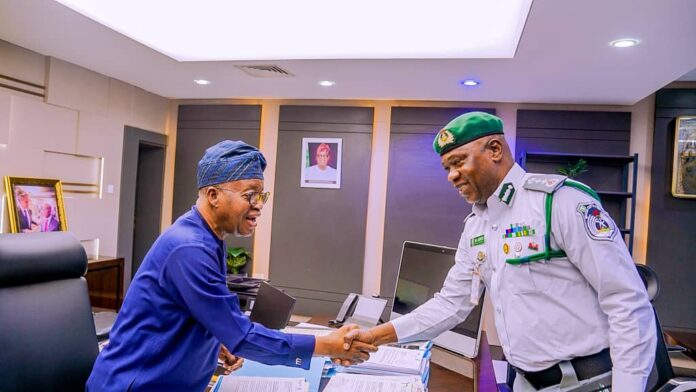The Federal Government has concluded plans to phase out physical inspection of cargoes in at the nation’s Ports.
By Emma Ogbuehi
In a major policy shift aimed at ensuring decongestion, facilitation of trade, elimination of corruption and other bottlenecks hindering quick clearance of goods, the Federal Government has concluded plans to phase out physical inspection of cargoes in at the nation’s Ports.
This was part of the agreements between the ministers of Marine and Blue Economy, Adegboyega Oyetola, his counterpart in the ministry of Transportation, Senator Said Ahmed Alkali and the Comptroller-General (CG)of the Nigeria Customs Service (NCS) Bashir Adewale Adeniyi after a meeting held in Abuja.
Physical examination of cargoes has been identified as among the factors working against efficiency and competitiveness and prompt clearance of goods at the ports.
The ministers and the Customs CG rather agreed on the use of modern technologies like scanners in addressing the issue of ports congestion, so as to ensure efficiency and competitiveness.
READ ALSO:
Tinubu speaks on ‘Japa syndrome’, assures Nigerians he’ll fix it
The resolutions were contained in a statement jointly signed by the spokesperson to the Minister of Marine and Blue Economy, Ismail Omipidan and the National Public Relations Officer of Customs, Abdullahi Maiwada.
Adeniyi was further asked to enforce the use of scanners at the ports while private investors were urged to invest in the deployment and maintenance of scanners at the nation’s ports.
The meeting also resolved to ensure a new construction that will bypass the fixed scanner at Apapa port, so as to ensure the unhindered progression of scanning process during crucial infrastructure development.
The statement reads in parts: “In a significant milestone for Nigeria’s maritime landscape, a pivotal strategic meeting was held at the Ministry of Marine and Blue Economy on Monday, January 15, 2024.
“The primary thrust of this collaborative venture was to deliberate and actualise initiatives that would not only open up ports but also foster seamless cooperation and trade and facilitation.
“A key focal point of discussion was the strategic integration of the Non-Intrusive Inspection Technology (NIIT) to bolster operational efficiency in Nigerian Seaports.
“Acknowledging the pivotal role of NIIT in actively decongesting ports, the meeting entrusted the Comptroller General of Customs with the mandate to champion and prioritize cargo scanning over traditional physical examination methods”.
The meeting also advocated exploring Public-Private Partnerships to oversee the installation and maintenance of scanning technology to sustain efficiency and foster innovation in cargo inspection processes.













